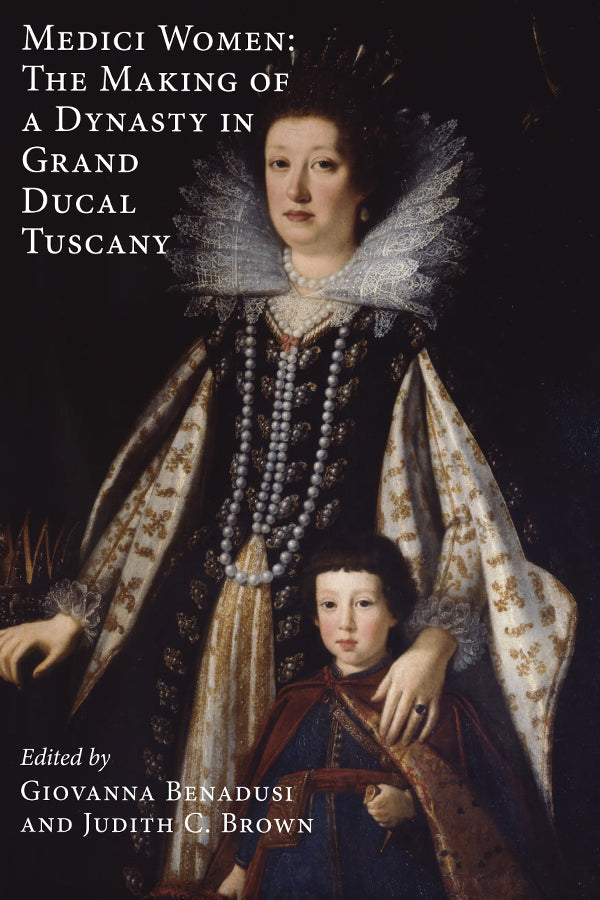Medici Women: The Making of a Dynasty in Grand Ducal Tuscany
Edited by Giovanna Benadusi and Judith C. Brown - ES36
Couldn't load pickup availability
Overview
The Medici grand ducal family and the court it created in the sixteenth and seventeenth centuries have long fascinated historians and the general public. Until recently, however, the women who married into the family or were born into it were relegated to the margins of history. Though long acknowledged as wives and mothers who contributed to the propagation of the Medici line, their function in the creation of the court, in shaping its culture, in contributing to the transformation of the state from a city-state republic to a principality, and in establishing the Medici’s place in the European network of dynastic rulers tended to be either ignored or maligned. It is only in the last decade or so that scholars have begun to reassess their roles and achievements. The aim of this book is to advance that reassessment.
Italian essays translated by Monica Chojnacka
Giovanna Benadusi is Professor of History at the University of South Florida. Her research brings together the study of women, gender, class, and the law in grand ducal Tuscany from the sixteenth to the early eighteenth centuries. She is currently completing a book on “The Law and the People: Legal Culture and Local Knowledge in Seventeenth-Century Tuscany.”
Judith C. Brown is Professor Emeritus of History and a former Vice-President for Academic Affairs and Provost at Wesleyan University. She has written extensively on gender and the economy in Renaissance Italy and is best known for her In the Shadow of Florence: Provincial Society in Renaissance Pescia (1982) and Immodest Acts: The Life of a Lesbian Nun in Renaissance Italy (1986).
380 pp.
Out of Stock
ISBN: 978-0-7727-2180-8 softcover
Published: 2015
Contents
Illustrations
Genealogical Tables
1: The Medici in the Republican and Grand Ducal Periods
2: The Medici Grand Ducal Family
Judith C. Brown, “Introduction”
1. Natalie Tomas, “Eleanora di Toledo, Regency, and State Formation in Tuscany”
2. Elisabetta Mori, “Isabella de’Medici: Unravelling the Legend”
3. Sarah Bercusson, “Joanna of Austria and the Negotiation of Power and Identity at the Florentine Court”
4. Sheila Barker, “Christine of Lorraine and Medicine at the Medici Court”
5. Maria Pia Paoli, “Foreign Mothers and the International Education of Medici Children: Christine of Lorraine and Maria Maddalena of Austria at the Medici Court”
6. Adelina Modesti, “Margherita de’ Medici Farnese: A Medici Princess at the Farnese Court”
7. Giovanna Benadusi, “The Gender Politics of Vittoria della Rovere”
8. Giulia Calvi, “Connected Courts: Violante Beatrice of Bavaria in Florence and Siena”
9. Stefano Casiu, “Anna Maria Luisa, Electress Palatine: Last Art Patron and Collector of the Medici Dynasty”
10. Marcello Verga, “Between Dynastic Strategies and Civic Myth: Anna Maria Luisa de’ Medici and Florence as the New Athens”
Praise
“This is a rich, remarkably cohesive collection that significantly advances our understanding of European court culture, dynastic politics and the gendered practices of power in the early modern period. Taken together, these ten essays transform the way we view the creation of the Medici dynasty … and offer valuable new perspectives on women as cultural agents.” — Sharon Strocchia, Emory University
“The consistency with which these new essays, relying on fresh archival research, dismantle old myths and encourage us to rethink many preconceived notions about some two hundred years of Florentine history represents a significant scholarly achievement, of which the editors of the volume and the authors of the individual essays should be proud.” — Bruce Edelstein, New York University
Reviews
The Historian, 79.3 (Fall 2017), pp. 618-619. Reviewed by Sam Goodfellow.
Renaissance and Reformation, 39.2 (Spring 2016), pp. 180-182. Reviewed by Jacqueline Murray.
The Sixteenth Century Journal (spring 2016), pp. 174-176. Reviewed by Elena Woodacre.


